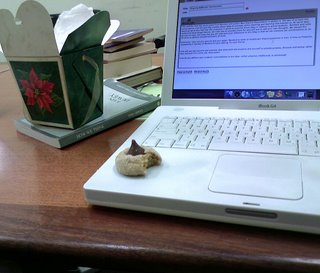We've been discussing where to find readings for our students. One excellent source is the NYU Library online database. It contains thousands of short stories, books, and poems along with the usual scholarly articles, news pieces, and research papers. But, most importantly, it's free as long as you have a valid NYU NetID. You can even go to the computer labs on campus and print out the stories for free.
The easiest way to get to the database is to log in to NYUHome like you would to access Blackboard. Click on the "Research" tab at the top of the page. (The link is marked in the picture below with a red arrow.) On the research screen you will see a list of databases on the right hand side of the screen under the title, "Article Search." Click on the link at the bottom of the list, "More databases and texts..." (Marked by the red arrow at the bottom right of the picture below. Click on the picture below for a close-up view.)

The "More databases and texts..." link will take you to the NYU Libraries website. You will see a list of links at the center of the page. Click on "Databases A-Z / Find Articles." (Marked with a red arrow in the screen shot below.) You will be asked to log in using your NYU NetID and password if you are off campus. (Log in just as you would on NYUHome.)
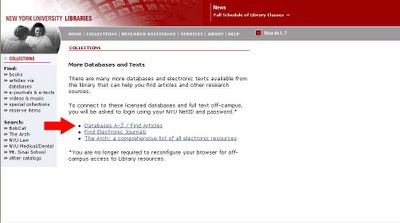
This link -- after you log in -- will take you to a page titled, "Find: Articles via Databases." You can jump to articles that cover specific subject areas by selecting a title from the pull down menu and clicking the start search button. You can also jump straight to the Arts & Humanities databases by clicking the link at the top of the list in the box at the bottom right corner titled, "Databases in:". (This link is marked with a red arrow at the bottom right of the screen shot below.) To find a database by title, click on the grey tab, "Databases by Title," at the center of the page. (It's also marked with a red arrow in the picture below.)
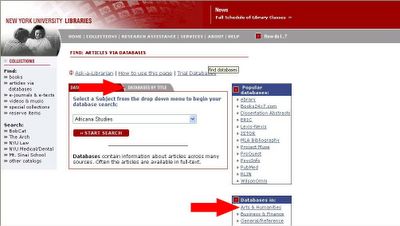
The "Databases by Title" page allows you to search for a specific database by name. Just type the name in the search box at the center of the page. You can also browse the databases by first letter. Just click on the first letter of the database name under "Databases A-Z". For instance, if you are looking for the "Literature Online" database, click on the letter "L" under "Databases A-Z". ("Databases A-Z" is marked with a red arrow in the screen shot below.)
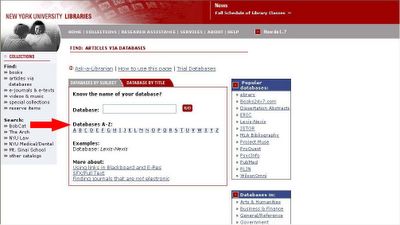
Clicking on "L" will take you to a list of all databases that begin with the letter L. One useful database under on this list is the "Literature Online" database. You can read a description of the database by clicking the "about" link next to each database name. Click on the "Connect" link to go to the database itself.
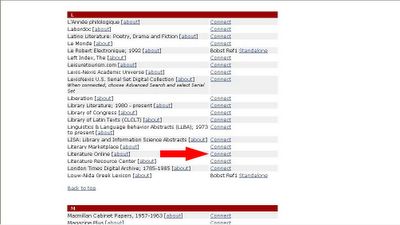
If you connect to the "Literature Online" database and then click on the "Authors" link under the "Search" menu in the upper left corner of the database home page, you will go to the database search page. Here you can search by the author's name, the years she lived, her nationally, her ethnicity, the literary movement she belongs to, and the literary period she wrote during.
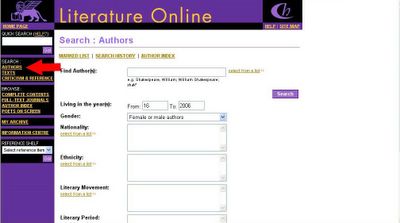
Some other useful databases are:
African-American Song: an online resource that documents the "history of African American music in an online music listening service. The collection contains a diverse range of genres such as jazz, blues, gospel, ragtime, folk songs, and narratives, among others."
Black Short Fiction: database of short stories and poems by African-American authors.
Humanities Full Text (Wilson): Full text of Humanities research papers, short stories, poems, and fiction.
Latino Literature: Poetry, Drama and Fiction: "Latino Literature (LALI) contains approximately 48 plays and 13,000 pages of prose and poetry by Chicano, Cuban, Puerto Rican, Dominican and other Latin writers working in the United States. Works are in English, with a few works of particular importance presented in Spanish."
Library of Latin Texts (CLCLT): "CLCLT is the world's leading database for Latin texts. It contains texts from the beginning of Latin literature (Livius Andronicus, 240 BC) through to the texts of the Second Vatican Council (1962-1965). It covers all the works from the classical period, the most important patristic works, a very extensive corpus of Medieval Latin literature as well as works of recentior latinitas. The complete works of writers such as Cicero, Virgil, Augustine, Jerome, Gregory the Great, Anselm of Canterbury, Bernard of Clairvaux and Thomas a Kempis can thus be consulted. The texts have been taken from the Corpus Christianorum series and from many other leading editions"
Literature Online: "The Master Index gives access via author or title keyword searches to all of the literary databases contained in Literature Online and also to all indexed third-party e-texts. Further Web Resources provides structured access to other websites of related interest to the main databases. They are grouped into eight time periods and sorted by general category. LION also includes full text Literary databases and Reference works."
Hope this helps. Enjoy!
